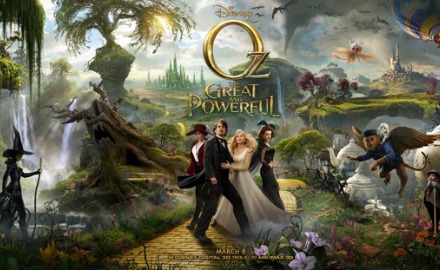The wizard lives up to the expectations of the people of Oz and of viewers watching his journey on the big screen.

Before Dorothy ever stepped foot into the Land of Oz, the mighty Oz himself attempted to free a flying monkey from the dire entanglements of plant branches.
Little would the wizard know the true danger was an incoming lion planning to eat the monkey.
With endless dangers and occasionally convincing animations, Disney’s “Oz the Great and Powerful” attempts to recreate the commercial magic that comes with spinning on classical works (three years ago, the studio’s remake of “Alice in Wonderland” became a commercial success). Their newest darling makes a nod to the widely popular and influential 1939 “The Wonderful Wizard of Oz” by telling the story of how the wizard came to stand behind his curtain.
Oscar Diggs (James Franco), or the fondly known “Oz,” is a Kansas con man working in carnivals before he is swept in a hot air balloon into the Land of Oz. Along the way, he not only manages to unknowingly enslave the flying monkey into a life of servitude, but also makes a bad impression on the good witch Glinda (Michelle Williams) and worse impressions on the bad witch sisters Theodora (Mila Kunis) and Evanora (Rachel Weisz). As Oz journeys to claim his prophetic spot on the throne at Emerald City, he spends so much time romancing the three witches that he proves to be a better womanizer than a wizard.
Despite the original plot, contradictions arise. The viewer never knows if the girl at Oz’s show in the beginning ever gets her ability to walk at the end, and the seemingly selective effects of the sleep-inducing poppies is never explained. Yet these plot flaws can be overlooked in the face of a generally impressive screenplay, in which the adventure is never truly predictable and the thrill of discovering which beauty ultimately wins Oz over parallels the apprehension when rooting for a favorite on the “Bachelor”.
The execution of the movie is also not the most impressive, as the childish animations and often exaggerated acting is sometimes eyeroll-inducing. In addition, the blatant repetition of the movie’s mantra —“We have nothing to fear; for if we believe, anything is possible”— becomes irritating and detracts from moments of suspense.
In the end, “Oz” succeeds in convincing its viewers to adventure along, despite occasionally patronizing cliches. The adventure is tastefully funny and, to be fair, it never claims to teach the audience something new. Instead, it reminds those of us who grew up enchanted by Dorothy’s journey of what we already knew: the true importance of a wizard is not in his ability to grant wishes, but in his ability to make the impossible real.








